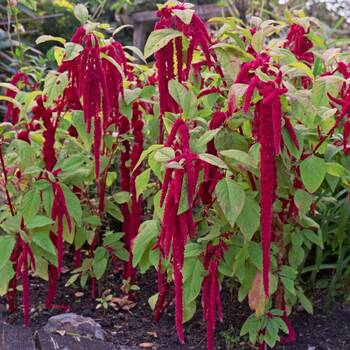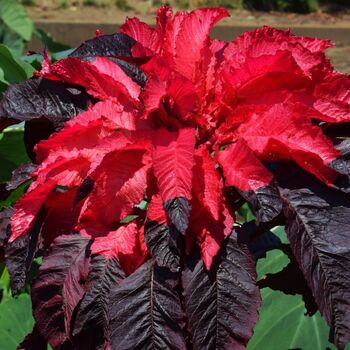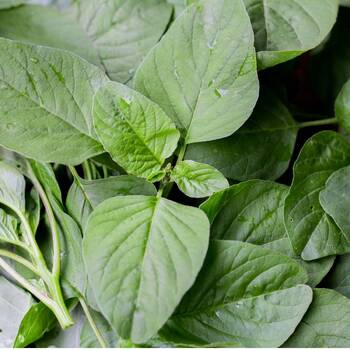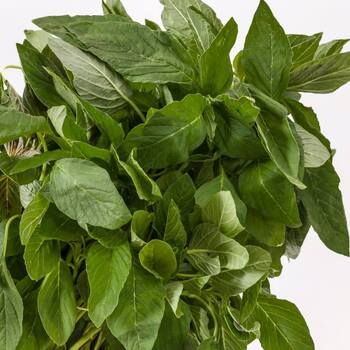
How to Grow Amaranth Seeds
Grow Guide #2226
Family: Amaranthaceae
Binomial name: Amaranthus sp.
Life Cycle: Annual
This 'How to Grow' guide details everything a home gardener needs to know to plant, grow and care for Amaranth (Amaranthus sp.).
Amaranth (Amaranthus sp.) can be grown for its foliage or its flowers. Varieties grown for their ornamental foliage have flowers but they are insignificant rather than showy. Globe amaranth (Gomphrena globosa) is a different species; refer to individual product listings for growing instructions.
When to Sow Amaranth Seeds
Amaranth is a warm season crop. Use the table below to identify the best time of year to sow amaranth seeds in your climate.
| JAN | FEB | MAR | APR | MAY | JUN | JUL | AUG | SEP | OCT | NOV | DEC | |
|---|---|---|---|---|---|---|---|---|---|---|---|---|
| Cool | ||||||||||||
| Temperate | ||||||||||||
| Sub-Tropical | ||||||||||||
| Tropical | ||||||||||||
| Arid |
Preparation
Amaranth plants are best grown in full sun. Choose a location that will receive at least 6 hours of full sun each day.
Amaranth plants need a well drained soil enriched with plenty of organic matter. Prepare soil by weeding it thoroughly, digging it over to loosen it and adding aged animal manure or compost. Keep the area free of weeds until planting. Learn more about preparing soil for planting here.
Amaranth plants can be grown in containers. If possible choose a variety that’s recommended for container growing. Use a good quality potting mix and make sure your container is large enough for mature plants; a minimum of 20 litres is recommended for amaranth. During the growing season, keep in mind that container grown plants may need additional fertiliser to encourage healthy growth.
How to Sow Amaranth Seeds
Amaranth seeds do not require any treatment (eg soaking, stratification) before sowing.
Amaranth seeds grow best when they are sown directly into the garden.
- Sow seeds directly in the garden 3mm deep and 60cm apart.
- Keep soil moist but never wet or dry.
- Seeds should germinate in around 7-10 days at a soil temperature of 20-25°C.
- Young seedlings will need protection from pests, pets and weather until they are established.
Amaranth is a tender crop that’s sensitive to frost. Do not transplant seedlings or sow seeds outside until all danger of frost has passed.
How to Grow Amaranth
Amaranth plants may need watering during the growing season. Water when the soil is dry about 5cm below the surface (test this by scratching away a little soil with your finger). Water deeply in the early morning or late afternoon. Avoid watering the leaves of plants to avoid fungal diseases. Learn more about watering here.
If soil was well prepared no extra fertiliser should be necessary. In poor soil or to give your plants an extra boost, application of a high-potassium fertiliser or one formulated for flowering plants can be beneficial:
- Apply slow release fertiliser at the recommended rate when transplanting or when seedlings are 5-10cm tall.
- Apply liquid fertiliser at the recommended rate and frequency while plants are fruiting or flowering.
Optional: Pinch out the growing tips of amaranth plants to encourage denser growth with stronger stems and more flowers. Using sharp secateurs or snips remove the top set of leaves, cutting just above a set of lower leaves.
Amaranth plants should flower in approximately 100 days.
Amaranth leaves are ready to harvest when they are large enough to eat. Harvest individual leaves by cutting them from the plant. Alternatively, whole plants can be harvested by cutting the stems at ground level. Amaranth is best eaten soon after it is harvested. Leaves can be stored short term in a perforated plastic bag in the fridge.
If growing amaranth for cut flowers, use sharp snips or secateurs to cut the longest stems possible, removing the lower leaves and placing the stems immediately in a clean bucket of water. Learn more about cutting and conditioning homegrown flowers here.
Deadhead amaranth flowers regularly during the growing season. Using sharp secateurs or snips cut fading or dead flowers off just above a set of leaves. Removing old flowers regularly will encourage plants to produce more flowers. Learn more about deadheading flowering plants here.
Common Problems when Growing Amaranth
Like all plants, amaranth is susceptible to some pests, diseases and other problems. Below is a list of the most common problems gardeners encounter when growing amaranth plants:
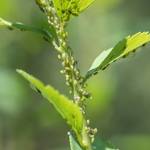 Aphids are small (2-4mm long) sap-sucking insects that congregate on the new shoots or the undersides of leaves. They can cause leaves to wilt or become discoloured, and also excrete honeydew which can attract ants and other insect pests. To manage aphids, remove them by spraying with a garden hose, apply a soap or alcohol spray, or encourage predatory insects to your garden. Read more about aphids here.
Aphids are small (2-4mm long) sap-sucking insects that congregate on the new shoots or the undersides of leaves. They can cause leaves to wilt or become discoloured, and also excrete honeydew which can attract ants and other insect pests. To manage aphids, remove them by spraying with a garden hose, apply a soap or alcohol spray, or encourage predatory insects to your garden. Read more about aphids here.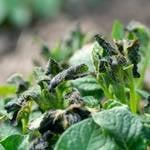 Frost damage can cause leaves to wilt and go black. Do not plant seedlings in the garden until all danger of frost has passed in spring, and harvest plants before winter. Prune all frost-damaged leaves to avoid them rotting on the plant.
Frost damage can cause leaves to wilt and go black. Do not plant seedlings in the garden until all danger of frost has passed in spring, and harvest plants before winter. Prune all frost-damaged leaves to avoid them rotting on the plant.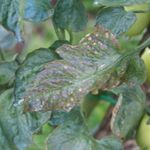 Downy mildew is a fungal disease that causes yellow to grey-brown patches on leaves, especially the undersides. Water plants at soil level (not on the leaves), remove and destroy affected leaves and do not overcrowd plants to ensure adequate air flow. If problems persist, spray with a homemade milk spray or fungicide.
Downy mildew is a fungal disease that causes yellow to grey-brown patches on leaves, especially the undersides. Water plants at soil level (not on the leaves), remove and destroy affected leaves and do not overcrowd plants to ensure adequate air flow. If problems persist, spray with a homemade milk spray or fungicide.


.png)



